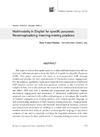Please use this identifier to cite or link to this item:
https://accedacris.ulpgc.es/jspui/handle/10553/12246
| Title: | Multimodality in English for specific purposes: reconceptualizing meaning-making practices | Authors: | Franca Plastia, Anna | UNESCO Clasification: | 570107 Lengua y literatura 550510 Filología |
Keywords: | English for Specific Purposes Multimodal Pedagogy Meaning-making Skills New Literacies |
Issue Date: | 2013 | Journal: | LFE. Revista de Lenguas para Fines Específicos | Abstract: | The rapid evolution from print-based to multimodal information has still notreceived sufficient attention from the field of English for Specific Purposes(ESP). This paper advocates the need to re-conceptualize ESP throughmultimodal practice for new opportunities of interactive learner engagement.For the purpose, qualitative, exploratory research was conducted on multimodalESP practice carried out with post-graduate students at the University ofCalabria in Italy. The study addresses the issues of how multimodal environmentscan affect ESP and how a multimodal assignment can influence learnermotivation, engagement and awareness. A theoretical multimodal semioticapproach was combined with multimodal pedagogy to investigate the benefitsof learners’ engagement in creating artefacts with content-specific language, aswell as developing awareness of their meaning-making processes. A questionnairesurvey revealed learners’ active involvement determined by intrinsic, extrinsicand achievement motivation of working in a multimodal environment. Learnerartefacts showed their ability to produce content-specific language in specializedcontexts of use and to creatively combine the linguistic elements with othersemiotic resources. In their explanations of meaning-making processes, learners further manifested their awareness of how multimodality can stimulatemotivation in learning, foster critical thinking and decision-making skills,enhance natural and flexible language learning, as well as the use of priorspecialized knowledge in switching between linguistic and other semiotic modes.The study suggests that ESP development can benefit more from a multimodalpedagogy which is grounded in the principles of learner-centredness, constructivistlearning and social interaction compared to the traditional instructivist approach. | URI: | https://accedacris.ulpgc.es/handle/10553/12246 | ISSN: | 1133-1127 | Source: | LFE. Revista de Lenguas para Fines Específicos [ISSN 1133-1127], n. 19, p. 372-396 |
| Appears in Collections: | LFE, Rev. leng. fines específ. n.19, 2013 Artículos |
Page view(s)
146
checked on Jun 29, 2024
Download(s)
454
checked on Jun 29, 2024
Google ScholarTM
Check
Share
Export metadata
Items in accedaCRIS are protected by copyright, with all rights reserved, unless otherwise indicated.
